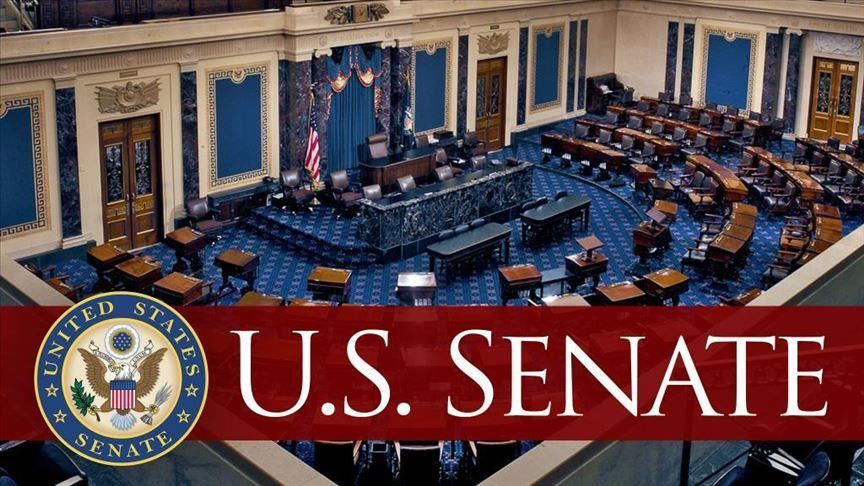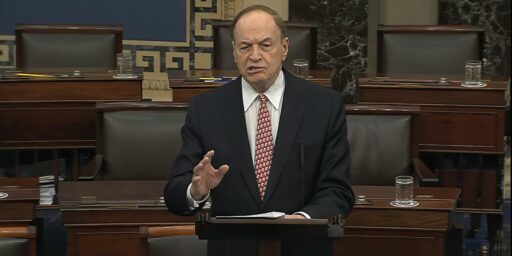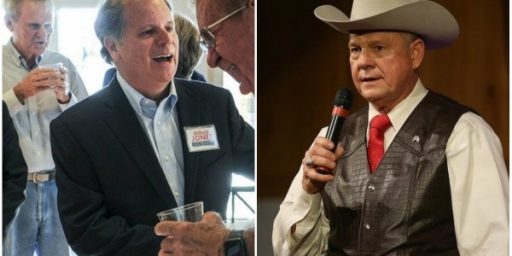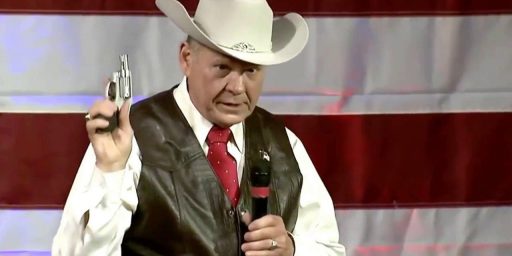Shelby Likely to Retire
Implications for Alabama and the GOP as well as considerations on the evolution of American politics.

Via the AP: Alabama senator has indicated he won’t run again.
U.S. Sen. Richard C. Shelby of Alabama, the Senate’s fourth most senior member, has told confidantes that he does not intend to run for reelection next year_— prompting some Republicans to urge the powerful, establishment politician to reconsider, even as potential replacements prepare to run for his seat.
Shelby will turn 87 in May and would be 88 at re-election, so the notion that he might be ready to retire is no surprise. He has been in the Congress, first in the House and then in the Senate, for over forty years.
While, obviously of direct interest to me, given where I live, his retirement is interesting in several broader ways that made it worth noting.
First, and perhaps least interesting, is that Shelby is a an old-school, bring home the bacon, kind of legislator:
he has used his influence to benefit the state’s interests, particularly ports and military manufacturers. He played a key role in bringing an FBI campus and the newly announced Space Command to Huntsville.
“I don’t know anybody who knows how to wield power like Shelby does,” said David Mowery, an Alabama-based political consultant.
“I would say that is his greatest accomplishment, to get money allocated to the state for many different projects,” former Alabama Republican Party Chairman Bill Armistead said.
From a constituent POV, I will admit that someone like Shelby is better for the state than someone like Tuberville, who really doesn’t understand how Washington works and really doesn’t have any clear vision for why he is in the Senate in the first place, save that it seemed like a cool idea to try.
I would note, too, that this at least tangentially touches on the issue of earmarks and other pork-barrel politicking that have been more limited in Congress for some time now, with earmarks (the ability to direct specific spending and projects back to one’s home district) having been banned with 2011.
The inability to bring money to districts cuts down on deal-making and also takes away traditional metrics of success in congress that can be used as a re-election argument. Instead, legislators have to resort to other ways to get attention and to build connections to constituents via rhetoric and identity, since they have less access to tangible benefits.
This leads me to the second issue: his replacement is far more likely to be Tuberville-like than Shelby-like. Both in terms of ability to bring money to the state, but also in terms of seriousness. Shelby’s exit will bring a lot of primary challengers and it will be a test of the wings of the party that we are now watching fight over MTG and the like.
Make no mistake: a Republican will win the seat in 2022. The mix of a Roy Moore-level nomination mistake coupled with a high-quality Democratic challenger like Doug Jones is simply not a likely scenario.
While I have some guesses about who might run, I will not at all be shocked if several challengers are more MTG-like than not. Nor will I be shocked if the winner falls into that camp.
Speaking of Moore, Shelby deserves some credit for Moore’s defeat, as he stated prior to the special election, “I couldn’t vote for Roy Moore. I didn’t vote for Roy Moore. But I wrote in a distinguished Republican name.”
Given the closeness of Moore’s loss, I suspect Shelby’s words on the subject had an impact on the outcome.
Third, Shelby is a living example of the evolution of the Republican Party, as he started his career as a Democrat in state politics and was elected to the House of Representatives in 1978 as a Democrat. He stayed in the party until the day after the 1994 mid-terms, when he switched parties after the “Republican Revolution” in that electoral cycle.
While there had been a trickle of conservative Democrats moving into Republican ranks over the decades it was 1994, which was the first time the GOP had a House majority since Eisenhower, that really opened the floodgates and began the process of fully sorting the parties by ideology and also leading to increasing geographic concentration.
This is significant for a host of reasons, but as I have noted many times prior, when people look back to the past and comment on how the system worked better back then, they often fail to understand the profoundly different structure of the party system.
It is also yet another illustration of the fact that parties don’t control their membership. Shelby changed parties by simply saying so. While there is no doubt that the GOP welcomed him, but that does not change the basic fact that this is another clear illustration that there is no central authority that controls the party’s label.
None of this is to be considered a specific assessment of Shelby’s legislative record, but is simply to point out his general placement in the history of American political evolution and that he is likely to be replaced by a very different kind of politician.





Maybe you’ll get really lucky and a genuine celebrity/Alabama state hero, like Nick Saban, will run this time.
When I saw the Shelby speculation last night, I noted that it was reported that various Alabama political heavy weights are encouraging Shelby to run. I suspect they figure he may die in office and the apparently, sane Alabama governor could make an appointment of a sane caretaker till the next election. Not sure why Shelby would want to do that, but it’s choice.
You mentioned earmarks, mutterings in Congress about bringing them back, which, if nothing else can change the incentives for congress critters.
@Just nutha ignint cracker: It would be hilarious if Saban ran as a Democrat. The cognitive dissonance of huge swaths of the population would be something to behold.
@Sleeping Dog: This would be a good reason for him to retire right now.
I suspect Roy Moore is closer to the median of the Republican Party these days than he was six years ago. Unless he has died in the meantime.
Electing a borderline pedophile to own the libs seems on brand, and I’m sure they will somehow reconcile this with the QAnon Globalist Pedophile Ring by saying “he’s a pedophile, but he’s our pedophile.”
—-
I remember when “pedophile” was meant figuratively in politics. Those were better times.
@Gustopher:
This has occurred to me. I suspect if there were a repeat of the Moore-Jones match today (which happened just a little over three years ago, not six), even in an off-year, special election, Moore would probably win.
I never liked Shelby, never having forgiven him for his smear campaign against genuine war hero Jeremiah Denton in the 1986 race. But, while he could be slimy and intellectually dishonest, I agree that he at least fulfilled the traditional legislative role well.
Likewise, my preferred model for party switching is Phil Gramm, who resigned his post in Congress upon switching parties, asking his constituents to send him back as a Republican. It’s more honorable. But we agree that party labels are ultimately tool of convenience that leadership can’t much control. And, indeed, Dems need to walk a tightrope with Joe Manchin and a couple of others, who could easily switch the control of the Senate if they wanted.
I wonder if part of the decline of Congress and the Senate in particular can be traced to the death of earmarks. A Republican could add a a Democratic earmark (or vice versa) to get a much needed vote. And let’s face facts. Only an Alabamian Senator gives a hoot if the state highway becomes part of the federal interstate system.
I’ve long felt that earmarks are, on balance, a good thing. If we could add a stipulation that every line of every bill had to have one and only one Senator or Rep name attached we would be getting somewhere.
@James Joyner: I honestly have no strong opinion about Shelby save that I thought him better than Sessions and he is unequivocally better than Tuberville.
In re: Gramm, I definitely agree about the appeal of that process, but he is the only example of that kind of party switch of which I am aware. On the one hand, I agree that it has the feel of honorable to it, but on the other hand, it was kind of a stunt that cost the state money to run the special election–since he was in the House it wasn’t like it was going to be that long before the voters got a say.
@Steven L. Taylor: Yes, that’s also fair. In 1994, there were few Blue Dog Democrats left in Alabama and I’d wager the overwhelming number of those who had re-elected him in 1992 also voted for Bush (or maybe Perot) rather than Clinton.
Unintended consequences are prevalent in politics, and it’s not too difficult to draw at least a faint line between the end of earmarks and the beginning of bat-$hit crazy GOP politics.
When a politician could no longer differentiate themself with a record of bringing home the bacon, they needed a new way to stand out. Taking on the illuminati, the new-world-order, the deep state, the Q-conspiracy “pedophiles”, or whatever mysterious boogyman that was out there turned out to be a way to reach a constituency that was already conditioned from childhood to believe in superstitious hocus-pocus thanks to Reagan’s courting of the religious right-wing.
I am not saying this was predictable, but I can see how we got here.
With state GOP organizations doubling down on the crazy, I wonder if a Doug Jones type might well be successful gaining Shelby’s seat.
In Washington State we have a top-2 primary, and it works wonders to keep the crazies out of office. Sure, they win the Republican nomination, but in heavily Red districts when they move to the general election, there’s typically a coalition of Democrats and reasonable Republicans that can win the office. While the parties themselves hate such a system, it may be the only way to save the Republicans from themselves.